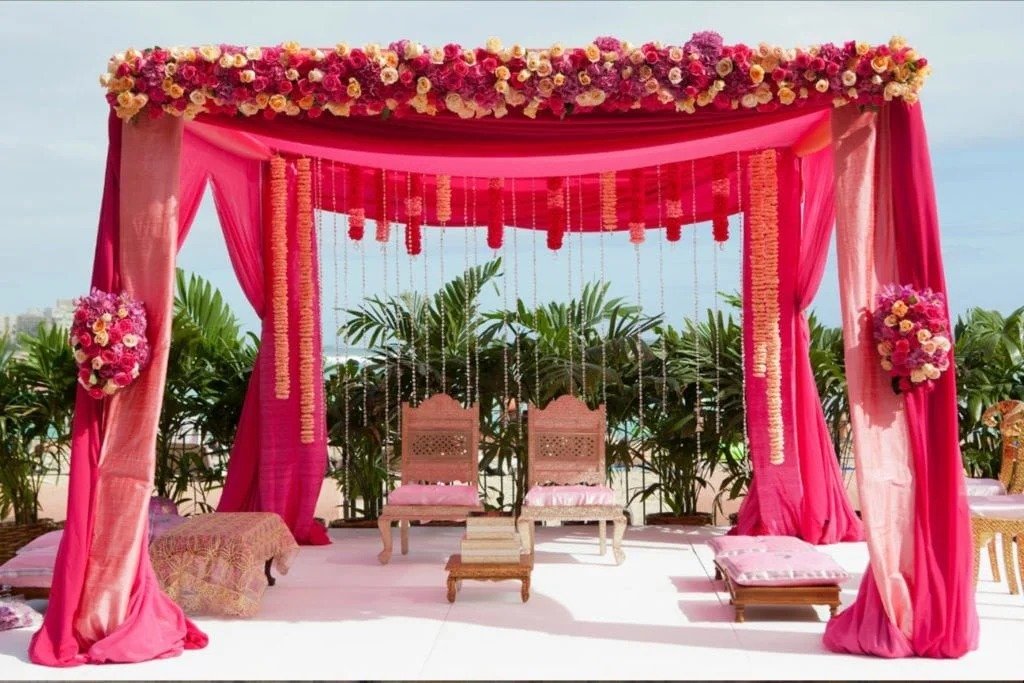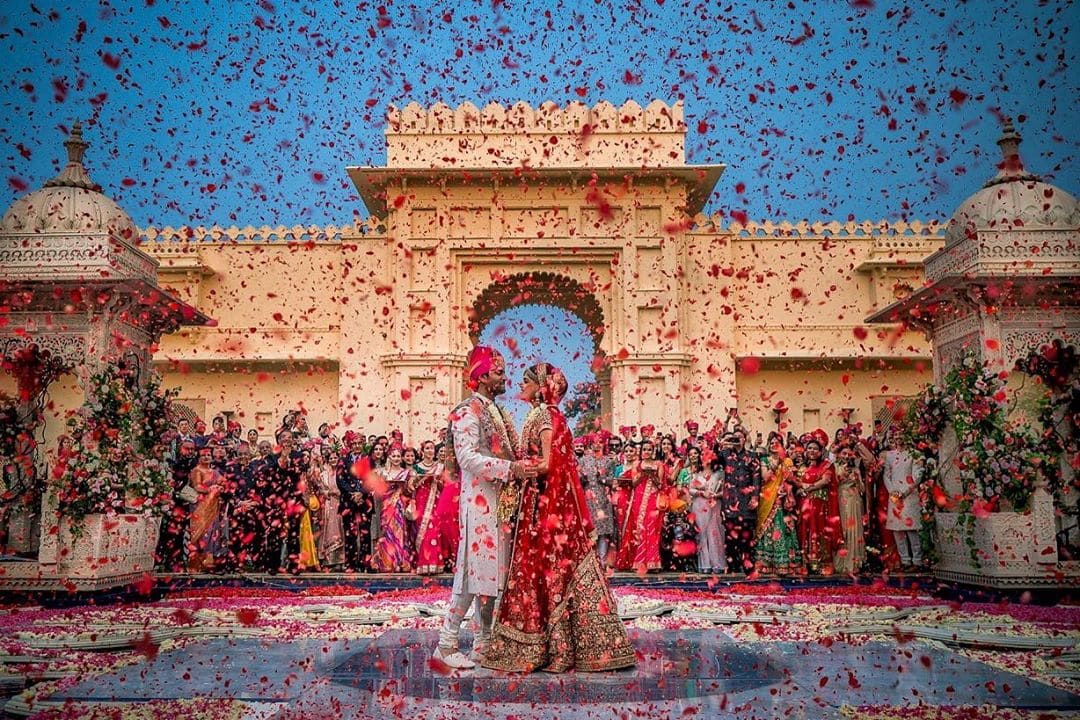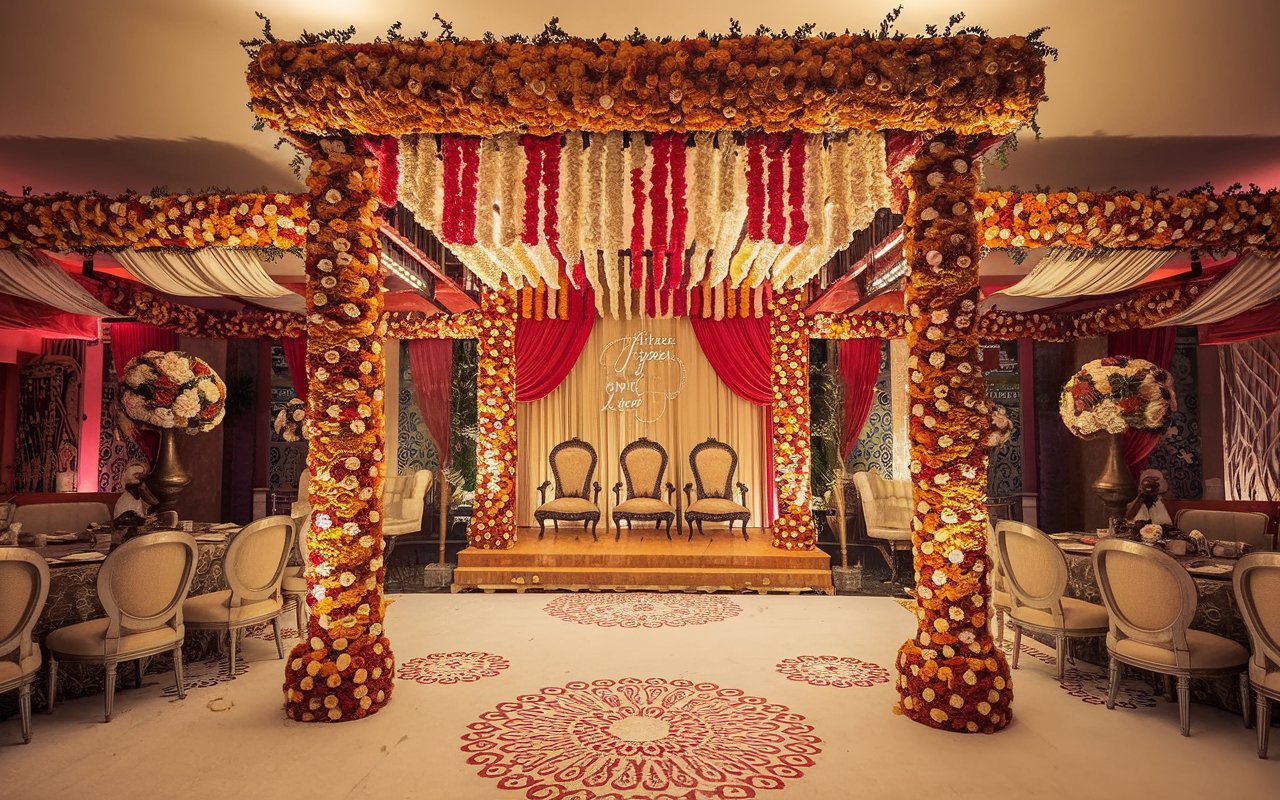Planning a wedding is a dream for many, but the first major decision—choosing the Perfect Wedding Venue in India —can make all the difference. Whether you’re imagining a regal palace wedding in Rajasthan or a serene beach ceremony in Goa, the venue lays the foundation for your wedding style, decor, guest experience, and budget. In a country as diverse as India, the possibilities are endless.
But with endless possibilities comes confusion.
Are you stuck between a luxurious destination wedding and an elegant hometown event? Do you wonder whether your guest list fits the venue, or if your budget can stretch for a scenic resort wedding?
Don’t worry. This guide will walk you through everything you need to know—from types of wedding venues to how your budget and guest count influence your decision. By the end, you’ll be better equipped to make a decision that suits your vision and your pocket.
Key Factors in Choosing the Perfect Wedding Venue in India
When it comes to selecting a wedding venue, it’s not just about aesthetics. It’s about making a choice that fits your wedding type, budget, guest list, and the overall experience you want to deliver. Here’s how to think through it clearly.
Wedding Type and Location
Start by deciding the kind of wedding you want. Is it a royal affair? A beachside celebration? Or a peaceful retreat in the hills?
- Palace Weddings: If you’re dreaming of a grand royal wedding, cities like Jaipur, Udaipur, Jaisalmer, and Jodhpur offer historic palaces with unmatched opulence. Venues like Umaid Bhawan Palace in Jodhpur or Fairmont Jaipur provide a majestic setting filled with rich heritage and luxury.
- Beach Weddings: Prefer the sound of waves and a sunset backdrop? Goa remains a top pick for beach weddings. On the East Coast, Mahabalipuram is catching up with scenic resorts like the InterContinental Chennai offering diverse venue options across vast beachfronts.
- Resort Weddings: If you want all your events in one location with luxurious comfort, resorts like ITC Grand Bharat near Delhi offer a sprawling and self-contained experience.
Choose your location not only for the beauty but also for convenience. Make sure your chosen destination is well-connected and doesn’t make travel difficult for guests.
Budget Allocation
This is where dreams meet practicality. Before you visit venues or reach out for quotes, define your total wedding budget. Experts suggest that 30% to 40% of your total wedding budget should be set aside for the venue.
Here’s a rough breakdown to guide you:
- If your total budget is ₹10 lakhs, spend around ₹3–4 lakhs on the venue.
- For a ₹30 lakh budget, ₹9–12 lakhs is a fair venue allocation.
Keep in mind that in luxury destinations like Rajasthan, per-person rates at 5-star properties (including stay, meals, and taxes) can range between ₹20,000 and ₹1.5 lakh per night. Your guest count will directly affect your total cost.
Guest Count and Exclusivity
This is often overlooked, but very important. The number of guests you plan to invite affects not only your catering and accommodation needs but also your venue’s exclusivity.
If you’re inviting 100–125 guests, you’ll likely need about 45–50 rooms. Booking a venue that has just the right number of rooms ensures the entire property can be reserved exclusively for your celebration. This means no interruptions, no outside guests, and full freedom to celebrate late into the night—without worrying about sound restrictions or pool access limitations.
However, if you choose a large hotel with 200+ rooms but only need 50, chances are, you’ll share the space with other weddings or tourists, which could restrict your freedom and vibe.
Connectivity
Even the most beautiful venue can feel like a mistake if your guests struggle to get there.
When shortlisting venues, always check:
- Is it easily reachable by air, road, or train?
- Are there direct flights to the nearest airport?
- Will your elderly or out-of-town guests find it convenient?
Connectivity impacts not only attendance but also how smoothly your vendors and planners can execute the events.
Venue Policies
Here’s where the fine print matters. Every venue has its own set of policies, and you need to understand them before signing a contract.
- Liquor Policies: Can you bring your own liquor or are you required to purchase from the hotel? Are there additional corkage charges?
- Decor Policies: Some high-end venues have in-house decorators. If you have a vision and a designer in mind, check whether outside vendors are allowed.
- Food Policies: Is outside catering permitted? Some venues require you to use their in-house kitchen, which could limit flexibility.
- Cancellation Policy: Life is unpredictable. Read the cancellation policy thoroughly—especially for natural calamities or emergencies.
- Inclusions: Ask for a detailed list of what’s covered—security, valet, electricity, furniture, projectors, sound systems, etc.
- Setup Time: Find out how many hours before the event your vendors can start setting up. For large-scale events, even a few hours can make a big difference.
- Layout/Floor Plan: Always request a layout of the venue to plan entries, exits, stage setup, and seating arrangements. This helps prevent last-minute surprises.
Wedding Venue Terminology You Should Know
Before you begin conversations with venue managers or planners, it’s helpful to understand some of the commonly used terms. These terms may seem minor, but they make a big difference in your negotiations and planning.
Minimum Guarantee
This refers to the minimum number of guests the venue charges for, regardless of your actual guest count. For instance, even if you invite 100 guests, but the venue has a minimum guarantee of 150, you will still be billed for 150.
Make sure this number aligns with your actual guest list to avoid paying more than necessary.
Maximum Capacity
This is the maximum number of guests a venue can accommodate, based on safety guidelines and seating arrangements. Always ask about this to avoid crowding or, worse, having to trim your guest list at the last minute.
Pax
Short for “passengers” or “people,” this term is commonly used in the hospitality industry. For example, if a banquet hall says they can host “200 pax,” they mean 200 guests.
Occupancy Types
- Single Occupancy: One person per room.
- Double Occupancy: Two people sharing a room.
- Triple Occupancy: Three guests in one room.
Knowing this helps in booking rooms efficiently and avoiding overspending on accommodation.
Meal Plans
Hotels often use coded terms to define what’s included in your booking:
- API (All-Inclusive Plan): Includes stay, all meals, and taxes.
- CP (Continental Plan): Stay + breakfast.
- MAP (Modified American Plan): Stay + breakfast + one major meal.
- EP (European Plan): Stay only.
Always double-check which plan is being offered and how it aligns with your food and event schedule.
Venue Types and Capacity Styles
- Banquet Hall: Indoor space, best for formal functions like sangeet or receptions.
- Lawn: Outdoor space, ideal for pheras, haldi, or mehendi under the open sky.
- Floating Capacity: This refers to how many guests the venue can host in a “circulating” manner, like in a cocktail party where guests move around.
- Seating Capacity: This is the number of guests the venue can accommodate seated at a time, important for seated dinners or rituals.
Knowing these terms makes communication clearer, helps avoid misinterpretations, and puts you in control during vendor discussions.
How to Find and Evaluate the Perfect Wedding Venue
Now that you’ve identified your wedding style, budget, and guest count, it’s time to actively search and evaluate venues. This stage can feel overwhelming—but with the right approach, it becomes manageable and even enjoyable.
Use Trusted Online Resources
To begin your search, explore dedicated wedding planning websites that list verified venues with detailed descriptions and reviews. Platforms like:
- WedMeGood
- WeddingWire.in
- WeddingsbyDestination.com
These allow you to filter venues by location, guest capacity, budget, and type of space (banquet, lawn, etc.). Most listings also include photos, videos, and package information, which helps narrow down your shortlist from the comfort of your home.
Initial Enquiry: Share Specific Details
When reaching out to a venue, the more specific you are, the better response you’ll get. Always provide:
- Your expected guest count
- Number of events planned (mehendi, sangeet, reception, etc.)
- Accommodation needs (single, double, or triple sharing)
- Food preferences (veg, non-veg, or both)
- Bride and groom’s names
This allows venue managers to tailor their proposal and tell you if they can meet your needs. You can also mention any special requirements, such as liquor license support, preference for outside vendors, or setup flexibility.
Conduct a Thorough Site Visit
Never finalize a wedding venue without seeing it in person. Photos online can be outdated or overly enhanced. During your visit, make sure to ask:
- What is the minimum and maximum guest capacity?
- What are the floating and seating capacities for each event space?
- Are there any other events scheduled around the same time as yours?
- What is included in the package? (Security, electricity, projectors, valet, etc.)
- Can you buy out the full property for exclusivity?
- What’s the policy on outside vendors?
- Is there a dedicated space for rituals like a hawan kund?
- What time does the team allow for setup and decoration?
- What is the cancellation or refund policy?
- Can they share a floor plan or layout of the space?
Take notes and photos during your visit. It will help compare options later.
Planning a Destination Wedding on a Budget? Here’s What You Need to Know
A destination wedding doesn’t always mean spending a fortune. If you’re dreaming of tying the knot away from your hometown—but within a reasonable budget—India offers many scenic and affordable venues. The trick is choosing the right destination based on season, guest size, and local hospitality.
Here are some wallet-friendly options that don’t compromise on charm:
Udaipur, Rajasthan
While Udaipur is known for royal weddings, it caters to different budgets. A decent wedding with tasteful decor and good food can be organized for ₹15 to ₹20 lakhs. If you’re aiming for a royal experience, the budget may go up to ₹50–60 lakhs—but many mid-range properties still offer beautiful palatial backdrops.
Goa
A beach wedding in Goa can be surprisingly affordable—if you pick the right season. Winter is peak time and can get expensive, but off-season weddings in summer are much lighter on the pocket. A well-planned Goan wedding for 100–150 guests can be pulled off within ₹15–20 lakhs.
Manali, Himachal Pradesh
One of the most popular hill destinations for weddings, Manali offers stunning mountain views and cozy venues. If you’re planning a guest list of around 200 people, you could plan an intimate destination wedding in the range of ₹8 to ₹10 lakhs.
Shimla, Himachal Pradesh
Shimla is ideal for couples looking to wed amidst pine trees and colonial architecture. A wedding with 150 guests can cost around ₹10–15 lakhs, including venue, food, and stay.
Mussoorie, Uttarakhand
Romantic and relatively quiet, Mussoorie is a hidden gem for destination weddings. You’ll find quaint resorts with open lawns and banquet halls, all within a ₹15–20 lakh budget.
Jaipur & Jodhpur, Rajasthan
Similar to Udaipur, but often with more variety in mid-range properties. A beautiful and subtle royal wedding can happen in ₹10–15 lakhs, especially if you book early and in non-peak months.
Kumbhalgarh, Rajasthan
Not as commercial as Udaipur or Jaipur, Kumbhalgarh offers a relaxed vibe with solid hospitality. A destination wedding for around 200 guests can be managed between ₹8 to ₹15 lakhs—making it one of the most affordable royal-style venues in India.
If your goal is to create a magical experience without exhausting your entire savings, these destinations are worth exploring. You can achieve elegance and intimacy without going overboard.
Final Recommendations: Making the Right Choice with Expert Support
Choosing the right wedding venue is more than just selecting a beautiful backdrop. It’s about finding a space that aligns with your budget, guest list, and vision—while also offering flexibility and comfort. As you move forward, keep these recommendations in mind:
Prioritize Venues That Allow Outside Vendors
Always ask if the venue allows you to bring in your own decorator, caterer, or planner. This gives you creative control and helps you manage costs. Even if a venue has a “panel” of vendors, having at least a few options introduces competitive pricing and better service.
Watch Out for Monopoly Clauses
Some venues work exclusively with specific vendors. Before booking, get clarity on costs, inclusions, and terms if you’re tied to in-house services. What looks like a good deal at first can quickly become expensive if you’re locked into overpriced vendors.
Consider New or Less Popular Venues
Newly launched resorts or lesser-known destinations often offer better deals to build their portfolio. If you’re open to exploring new properties, you might land a stunning venue at a fraction of the cost—along with more attention to your event.
Always Negotiate
Even if a venue’s pricing looks fixed, it’s worth negotiating. Ask about early-bird offers, off-season discounts, or complimentary services like welcome drinks or DJ setups. A little negotiation can often go a long way.
Seek Professional Guidance
This is where an experienced wedding planner makes all the difference. From helping you shortlist venues to reading the fine print and coordinating logistics, a professional planner ensures nothing slips through the cracks.
If you’re searching for venues and planning support in Kolkata, this is where Rupa Event Planner can help.
With years of hands-on experience and a portfolio of successful weddings, they specialize in wedding venue selection, decor planning, logistics, and vendor coordination—all tailored to your taste and budget.
You can explore their services and get in touch through their website: https://rupaevenplanner.com




